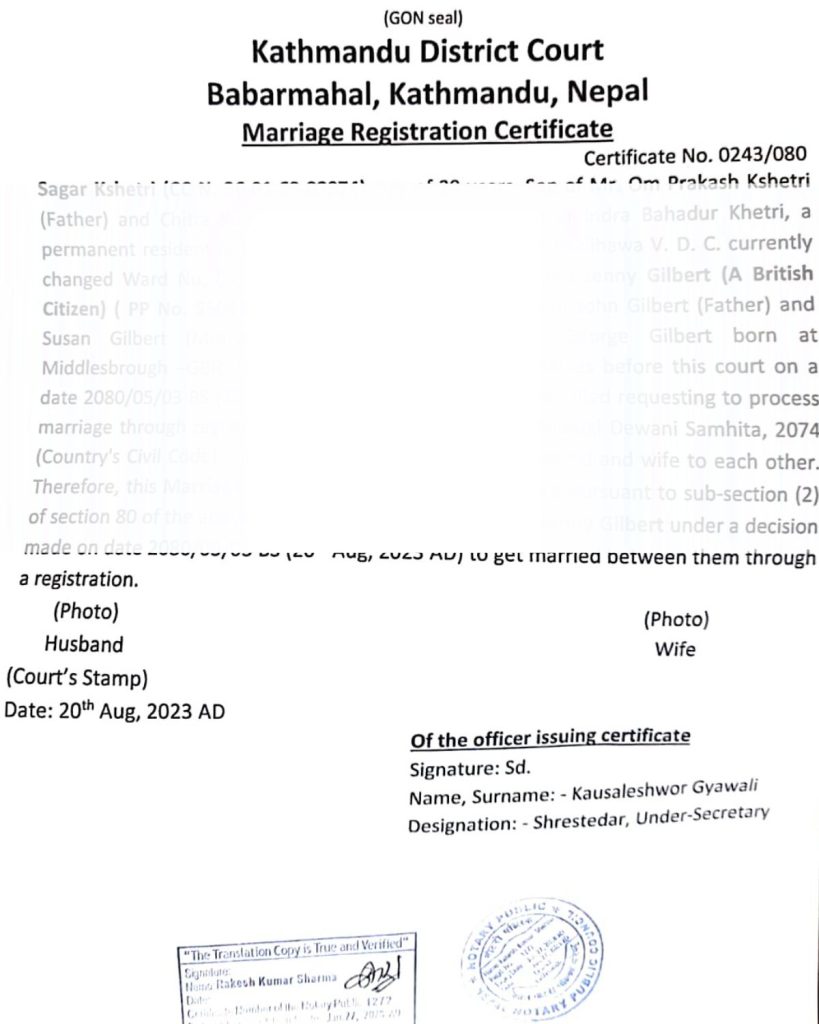This article will guide you through all the information about the notary public and translation in Nepal. The notary is guided by the Notary Public Act, of 2063.
A notary public is a public official who serves as an impartial witness to the signing of important documents and administers oaths. Notaries play a crucial role in preventing fraud and ensuring the authenticity of legal transactions.
Their responsibilities typically include verifying the identity of signatories, certifying signatures, and confirming the willingness of all parties involved. Notaries also affix their official seal or stamp to the documents to attest to their validity. This article will delve into the significance of notary public services and their impact on various legal and financial processes.
Notary public responsibilities typically include verifying the identity of signatories, certifying signatures, and confirming the willingness of all parties involved. They also administer oaths and affirmations, witness the signing of important documents, and affix their official seal or stamp to attest to the validity of the documents.
Additionally, notaries are expected to maintain impartiality and adhere to legal and ethical standards to prevent fraud and ensure the authenticity of legal transactions. These responsibilities are crucial in upholding the integrity of various legal and financial processes.
Notary Public and Translation in Nepal

Provisions Relating to the Certificate of the Notary Public
Notaries are prohibited from working without a license. Those who wish to obtain certification for translation and other specialized activities as determined by the Nepal Notary Council must pass a critical exam.
Qualification of Notary Public
- A lawyer who has been following the law continuously for seven years.
- At least Gazetted II from Nepal Judiciary. A person who has retired as a ranking officer.
Disqualification of Notary Public
- People who failed the examination taken by the council.
- Persons who are disqualified in accordance with Article 12 of the Notary Public Act, 2063.
- Persons convicted of crimes: Murder, robbery, kidnapping, fraud, terrorism, corruption, violence, drug use and trafficking, human trafficking, or serious crimes of a similar nature.
- The person’s attitude is not very good.
- Not Citizens of Nepal
- Persons declared bankrupt.
- People with mental disorders.

The Function of the Notary Public
- Certification of a document;
- Translation of documents from one language to another and
- Certification of a copy of the original document.
Activities not to be Performed by the Notary Public
- Certification of documents that are not registered in the official registry,
- Certification of all kinds of documents that are its self original documents,
- Certification of the documents which is to be made by him/her,
- Verification of documents regarding his/her own purchases and satisfaction,
- Verification of documents of the relatives.
- Disclosure of information obtained during the verification of documents without the consent of both parties, except where required by law,
- Adding and removing or modifying or modifying securely stored information in the text or file,
- Verify the information without following the procedures specified in Article 27 of the Notary Public Act, 2063.
- Unauthorized or neglected evidence,
- Cost of authentication or interpretation of documents more than a fixed amount,
- Interpretation of alleged documents,
- Date stated in different documents, interpretation of numbers or details,
- Performing the role of the author outside the law,
- Verify the identity of the document without being the person who created it.
- Violation of Code of Conduct.
- Violating this law or the rules contained therein and
- Performing other duties under the law.
Procedure Relating to Translation of Paper
- If the application is received, the office must confirm the accuracy of the information in the documents.
- If there is any doubt about the accuracy of the information, the author can check the information, verify it, or consult the institution or organization that provided the information.
- If, after questioning, the information is found to be correct, the author must interpret the information and check it against the rules.
- Other regulations regarding this document Translation of the text must comply with the rules.
Procedure Relating to Attestation
The process must be followed by the notary, and a copy of the original document must meet the requirements.
